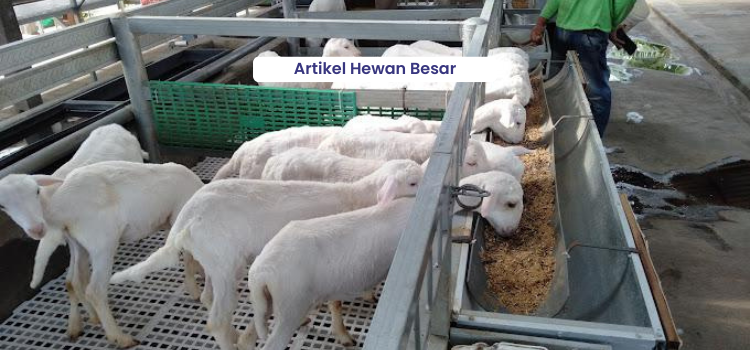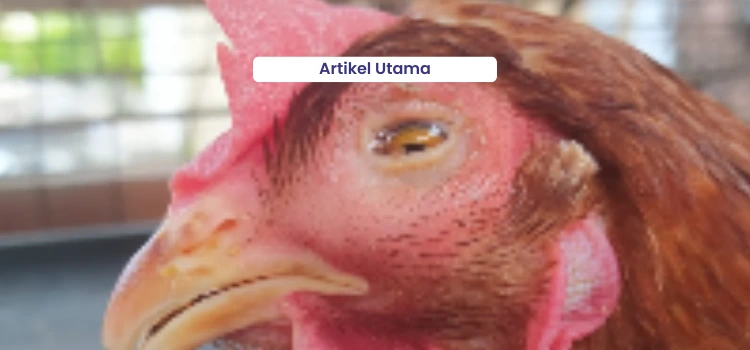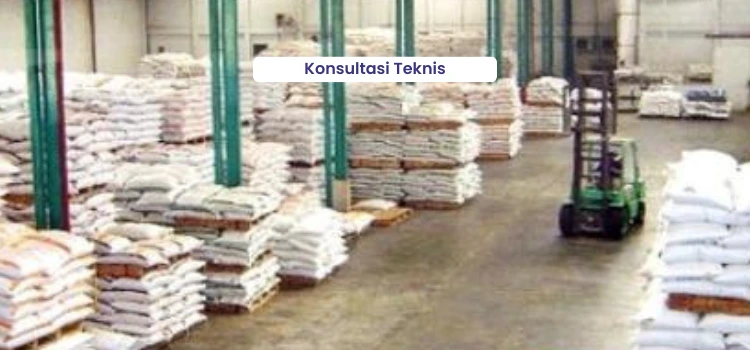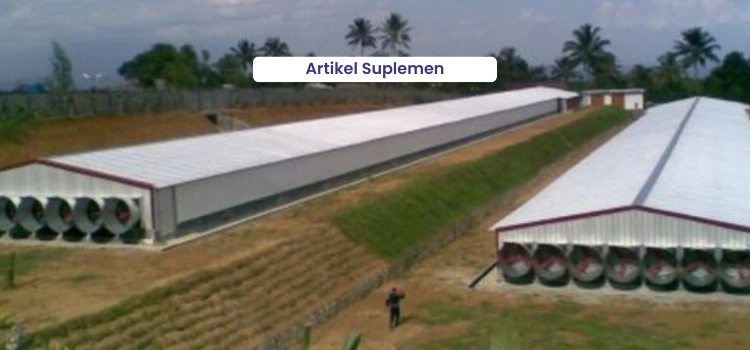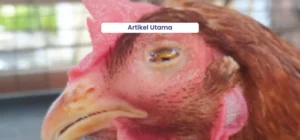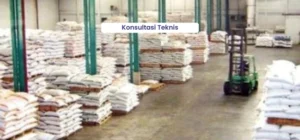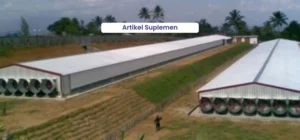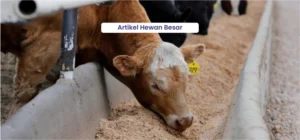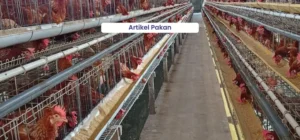The demand for sheep and goat meat in Indonesia remains high, presenting a significant opportunity for local production to meet this need. The Indonesian Ministry of Agriculture estimates that national meat demand in 2025 will reach 739,668 tons, an increase of around 2% from 724,200 tons in 2024. The population of small ruminants, goats and sheep has also increased, with a 52.7% rise in sheep and an 8.2% rise in goats from 2023 to 2024.Therefore, sheep and goat farming holds promising prospects, especially with the surge in demand for sacrificial livestock during Eid al-Adha. In addition, raising sheep and goats offers several advantages: they are relatively easy to manage, require minimal land, and can adapt well to changes in environment and climate. Beyond meat, these animals can also provide additional value through milk and leather production.
One of the keys to achieving optimal productivity in goat and sheep farming is the implementation of good health management. Efforts to maintain livestock health include maintaining biosecurity and applying health programs such as administering deworming medication to control or treat parasitic infections, and providing vitamins to strengthen the immune system so that the animals become more resistant to disease. With proper management, disease disturbances can be minimized effectively.
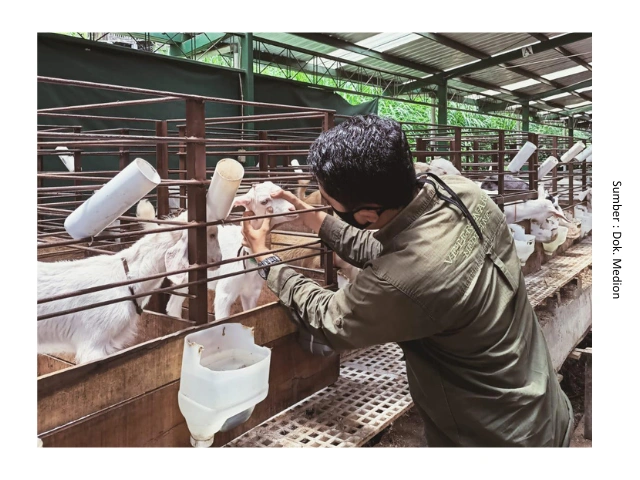
The Importance of Paying Attention to Livestock Health
Health issues in goats and sheep can arise from both non-infectious and infectious diseases. When conducting livestock health checks, several aspects must be observed, such as appetite, body condition, and the surrounding area (including feces, urine, and presence of blood). Observe the animal’s physical condition — nose, eye clarity, and coat quality — as well as its posture and movement to determine whether it walks normally or shows lameness, and check for any wounds or swelling.If clinical symptoms or abnormal conditions are found during the examination, immediately isolate the affected animal in a separate pen and provide appropriate treatment according to the disease under the guidance of a veterinarian.
Sheep and Goat Health Program
A health program must be implemented to improve and maintain livestock immunity as well as prevent diseases. Disease prevention efforts in sheep and goats through a health program include:
• Vaccination
Vaccination is one of the most effective ways to prevent the spread of diseases in livestock, including sheep and goats. Several viral diseases can be prevented through proper vaccination. Each disease requires a specific type of vaccine. Vaccination programs and implementation should follow the recommendations of the local Livestock and Animal Health Office, such as vaccination against FMD (Foot and Mouth Disease).
• Supplement administration
The administration of multivitamin supplements is beneficial for preventing and treating diseases caused by vitamin deficiencies, stimulating appetite, improving metabolism to accelerate growth, and increasing productivity. Routine vitamin supplementation is recommended every two months, but it can also be given when livestock appear sick or weak. Examples include Vita B-Plex Bolus, Injekvit B Plex, or ADE-Plex Inj.For newly arrived livestock, Bioselvita and Transolit can be administered. Bioselvita helps overcome muscle disorders and increases energy intake before and after transportation. ATP is one of the most important energy sources required by the body. The magnesium, potassium, sodium, and vitamin B12 content in Bioselvita aids in relieving muscle problems and repairing muscle tissue pre- and post-transportation.The vitamin C content in Transolit acts as an antioxidant and helps reduce cortisol levels, thereby alleviating stress. Other nutrients also help improve appetite, boost immunity, and support physiological and metabolic activities in the body.
• Deworming treatment
Deworming treatment should be administered to prevent parasitic worm infections. Worm infestations pose a serious threat to sheep and goats and must be carefully controlled. Animals free from internal parasites are generally healthier, gain weight more efficiently, and thus have higher market value.Administer dewormers at the proper dosage, such as Nemasol K, Wormzol K, Wormzol Suspension, or Vermizyn SBK. The Wormzol product line is not only effective against all stages of roundworms but can also eliminate tapeworms and adult liver flukes.Deworming should be repeated every 2–3 months to ensure complete eradication of parasites and to break their life cycle. For example, deworming can be scheduled when animals first arrive at the farm and then again three months into the fattening period to keep worm infections under control. If specific symptoms appear, such as one goat becoming noticeably thinner, further action should be taken—such as fecal examination and more intensive treatment.
Several other important efforts to maintain the health of sheep and goats and help maximize their productivity include:
• Minimize disease sources
Biosecurity should be implemented from the moment the livestock arrive at the farm. The goal is to prevent disease transmission. Preventive measures include cleaning and disinfecting the barn and equipment. Avoid the buildup of manure and leftover feed, and maintain good drainage so the barn stays dry and not humid. Clean the feeders by removing leftover feed and any dirt present. Manure under raised-floor barns should also be cleaned regularly, at least once a week.Feed and water containers should be washed and disinfected routinely using Medisep. When the barn is empty, Formades can be used after washing. It is also important to spray anti-ectoparasitic solutions on the floor and in the gaps of the barn using Kututox-S or Delatrin. When livestock are infested with ectoparasites, they often lose their appetite.If adult flies are already swarming in the barn, farmers can eliminate them using insecticides such as Flytox and Delatrin. Flytox is an effective insecticide for controlling flies in livestock areas without causing resistance; it works quickly and has long-lasting effects. Likewise, Delatrin provides a strong knock-down effect that kills flies instantly. Flytox is applied by sprinkling, while Delatrin is applied by spraying.Newly arrived sheep and goats should be quarantined, and sick animals should be isolated to prevent disease transmission. During quarantine, animals adapt to their new environment, including the feed that will be provided. After 7–21 days, if the animals remain healthy, they can be moved to the main barn. If sheep or goats are infected with a particular disease, treat and isolate them immediately, as sick animals can be a source of infection.
• Comfortable housing conditions
Providing proper housing is an important factor in ensuring the safety, comfort, and productivity of livestock. A good barn should be clean, have adequate sunlight, provide shade, and be safe and sturdy. Ensure good air circulation inside the barn and minimize dust accumulation. Adjust stocking density so that all animals have equal access to feed, water, space, and oxygen, ensuring uniform growth and productivity.The barn floor should dry quickly and be easy to clean. It is best to use materials such as wood, bamboo, or safe plastic slats. Medion Plastic Slats can be used as flooring for elevated sheep and goat pens.
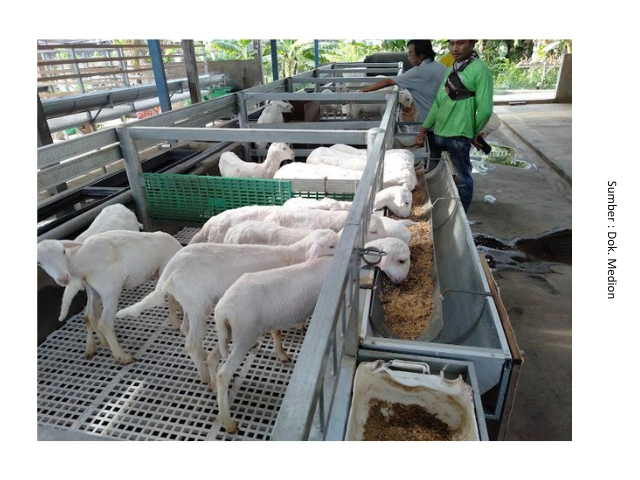
• Nutritious feed and water according to livestock needs
Feed is an essential component in livestock farming. Nutritious, fresh, and contaminant-free feed is considered good-quality feed for livestock. High-quality feed must contain essential nutrients such as carbohydrates, proteins, fats, vitamins, and complex minerals and should be provided in adequate amounts according to the needs of sheep and goats.The provision of nutritious feed should be adjusted to the livestock’s daily requirements by maintaining a balanced formulation between carbohydrate, protein, and forage intake. However, for intensively raised livestock, feeding freshly cut grass directly is not recommended. It is better to wilt the grass first before feeding it to prevent worm infections and bloating.Provide feed supplements containing vitamins, minerals, and amino acids such as Mix Plus Cattle Pro and Mineral Feed Supplement S to maintain the health and growth of ruminant livestock. Always ensure a sufficient supply of clean, fresh water is available at all times.
• Health inspection
Livestock health monitoring should be carried out continuously. The purpose is to detect any health disturbances early and identify abnormalities in the animals so that sick or abnormal livestock can be treated promptly. Daily health checks can be performed every morning, for example, during feeding time.
With sheep and goats performing well indicated by healthy condition and high daily weight gain farmers can achieve greater profits. This also increases the potential success of sheep and goat farming businesses. Hopefully, this information is useful.

